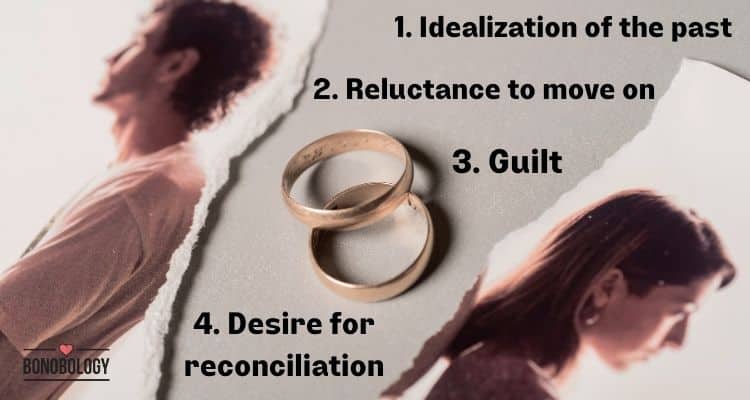Whenever the matter of ending a marriage is brought up, the most common advice is to not make the decision to divorce lightly. While it’s true that staying in an unhappy marriage can be a deeply stifling and frustrating experience, calling it quits before you have exhausted all your options to try and make it work with your spouse can lead to overwhelming feelings of divorce regret.
Once the divorce decree has been signed, there is usually no going back. If, in hindsight, you begin to realize that ending the marriage was a mistake, the regret and guilt after divorce can linger on for the rest of your life. After all, divorce reconciliation stories are few and far between. Statistics suggest that only 6% of divorced couples reconcile. On the other hand, the divorce regret statistics, according to a survey published in the Daily Mail, are overwhelming, with 54% of divorcees “wishing they had never ended their marriage”.
If you’re currently contemplating ending your marriage, these numbers can lead you to wonder, “Will my ex-wife ever regret divorce?”, “Will my ex-husband wish we didn’t go through with the divorce?”, or “Will I regret getting a divorce?” If you’re already divorced and grappling with thoughts like, “Leaving my wife was a mistake” or “I wish I hadn’t left my husband”, we can only imagine the emotional turmoil you’re facing. To help ease your confusion, let’s take a look at what regretting divorce means, what are its signs, and ways to cope, in consultation with counseling psychologist Shazia Saleem (Masters in Psychology), who specializes in separation and divorce counseling.
What is Divorce Regret?
The end of a marriage often leads you down a road paved with many emotions, among which, regret can be one of the most challenging to navigate. Divorce regret refers to the profound sense of remorse or uncertainty experienced that comes in the wake of the dissolution of a marital bond. As indicated by the aforementioned divorce regret statistics, this phenomenon is more common than we might think.
Explaining what brings on this sense of regret and guilt after divorce, Shazia explains, “Divorce often tends to be a reactionary decision, fueled by negative emotions such as rage, anger, and revenge. Any decisions based on extreme emotions, whether positive or negative, cannot be practical. Add to the fact that there is still negativity and stigma attached to divorce in most societies, guilt and regrets often starts to creep in once the emotions fueling the decision to divorce begin to settle down.”
This can lead one to wonder, “When does divorce regret set in?” Well, there is no specific timeline for it. It can occur at any time post-separation, often when the pain and angst associated with what issues led to the breakdown of the marriage are replaced by “what if” questions and “what could have been” scenarios.
For instance, if the decision to walk away was prompted by extramarital issues, both partners may experience regret divorce after infidelity, but in different ways. The partner who cheated may regret that their actions caused the marriage to fall apart. And the one who has been cheated on may regret hastily walking away from the marriage.
5 Signs of Divorce Regret
If this has led you to wonder, “Will I regret getting a divorce?” or “I miss being married sometimes, does that mean I’m regretting divorce?”, know that not everyone second-guesses this decision with a feeling of remorse. The divorce regret psychology varies depending on the circumstances leading to the divorce, the quality of life after it, and your journey of healing from this setback.
Just because you think of your ex or feel nostalgic about the happy times in your marriage doesn’t necessarily mean you regret the divorce. As Reddit user, Soggy_Cartographer18, says, “I hate that my marriage didn’t work out. I miss the idea of being married. I miss having another adult around. I miss the societal benefits of being married. On days like today, I see other couples doing the Valentine’s Day Challenge on Facebook and I feel pangs of “Why don’t I get that?” And I am lonely at times and I am sad. OLD can be demoralizing when it’s bad.
“However, on Friday at work, I was talking to a woman who just separated and I said that while I miss being married, I don’t miss my ex. And my loneliest divorced day is still better than being with him. Feeling lonely because you’re alone is one thing. Feeling lonely because your spouse is ignoring you for yet another evening is worse.”
To help you identify what it is that you’re feeling, let’s look at the top signs of divorce regret:
1. Idealization of the past
Divorce regret psychology is rooted in looking at the past with a sense of rose-tinted nostalgia that leads to romanticizing the past, selectively recalling pleasant memories while glossing over conflicts that led to the marriage breakdown.
Shazia says, “At this stage, self-doubt begins to creep in and you’re no longer sure if getting a divorce was the right choice.” You may be idealizing the past and wishing that you hadn’t let your ex go, if,
- Thoughts like, “I left my husband for my lover and regret it” or “Leaving my wife was a mistake”, dominate your headspace
- You can no longer remember the toxic traits, issues, and annoyances that drove you up the wall
- Your reminiscence of the relationship is limited to the honeymoon phase
- You have a feeling of fondness toward your ex
2. Overwhelming feelings of guilt
Shazia says, “A person who regrets going through with their decision to divorce their spouse may start guilt-tripping themselves about the entire episode.” Here’s what that can sound like,
- My marriage ended because of me
- I should have tried harder to make the marriage work
- I left my husband for my lover and regret it
- I was not good enough, and that’s why my marriage failed
These accusations leveled against one can start a cycle of sadness. At its root, is the desire to have done things differently.
3. Reluctance to seek new relationships
While it’s natural to be wary of putting yourself out there after the end of a marriage, most people revive their romantic life after the divorce, at some point. According to a survey, 93% of divorcees get into new relationships. So, if it has been some time since your divorce and you still experience an unusual hesitation about starting a new relationship, it can hint at lingering feelings for an ex-spouse or a deep-seated fear of repeating past mistakes.
4. Rethinking the severity of issues
Experiencing guilt or asking, “Why do I feel guilty about divorcing my husband?”, or struggling with remorseful thoughts like, “Leaving my wife was a mistake” can be a result of societal pressure and personal expectations ingrained in us about marriage and its longevity.
Shazia says, “The societal expectations of being single again can make a person introspect and reassess the severity of issues because of which the marriage ended. There can be a lingering sense that the difference and disagreements weren’t irreconcilable after all.”
5. Desire for reconciliation
The clearest sign of regret is a desire to reconcile with an ex-spouse, irrespective of what led to the divorce. For instance, a person who fell in love with someone else and left their spouse for their affair partner may also regret divorce after infidelity.
They may start comparing their affair partner to their ex-spouse, which may lead them to think, “I left my husband for my lover and regret it” or “I should never have left my wife for another woman.” Likewise, comparing other relationships or new partners to an ex-spouse can also indicate that the person is not over their previous marriage, signaling divorce regret.
How to Deal with Divorce Regret – 7 Expert Tips
A longing for the past, a desire to go back to the happy phase of the relationship is a recurring theme in most divorce regret stories. As Reddit user, IN8765353, says, “I miss being married, I miss home, frankly, I miss having a man around to help me with sh*t (shoveling snow, installing and hanging things, figuring out technology, and handling the pet care). I miss having someone to cook for and eat with. I miss having someone that really knows me. I do miss my husband a lot even in real time but I desperately miss the way things used to be, when marriage was happy and easy and effortless and loving.”
There is no doubt that moving on after divorce is a profound emotional challenge that requires compassion and care. Given how rare divorce reconciliation stories are, once you’ve crossed that bridge, it’s in your best interest to stop looking at the rearview mirror of life, and instead, focus on finding a way forward. Here are some expert-recommended strategies to help you do just that and deal with divorce regret:
1. Work toward acceptance
When a relationship ends, it brings in its wake all sorts of complex emotions, including pangs of regret and remorse. What’s vital is to not push these feelings away or let them scare you into thinking you didn’t try hard enough or that you should have given your marriage a second chance. It’s okay to admit regret. “Acceptance is the first step toward healing and moving forward into a new life. Divorce is never easy. Try not to give it an ugly turn. Understand that the relationship was not meant to last forever.”
it’s crucial to remember that many people find strength in these challenging times, and statistics on life regrets often overlook the growth and resilience borne from adversity. In fact, some attest that “divorce was the best thing that ever happened to me”, emphasizing their journey of self-discovery and happiness post-separation.
Happiness after divorce statistics show that 67% of women and 59% of men are happier 2 years after the divorce. So, are people happier after divorce? While there is no one concrete answer to this question, the trend indicates that the road may be rough initially but a brighter horizon often lies ahead.
2. Redefine your perspective
- “Will my ex-wife ever regret divorce and come back to me?”
- “Will my ex-husband ever want to reconcile?”
- “Do ex-spouses miss each other?”
If such questions are swarming your mind, it’s a sign that you look at your divorce as a testament to the fact that you failed at marriage. It is this perspective that you need to change to be able to shake off the regret. View the divorce and your failed relationship as a learning experience instead.
“The process of dealing with regret starts with normalizing separation or divorce. Work toward wholeheartedly owning the fact that it’s absolutely OK if the relationship did not work,” advises Shazia.
3. Seek professional support
Whether you’re consumed by the thoughts of reconnecting with him or winning her back after divorce, or wondering, “Will I be alone forever after divorce?”, it’s a sign that you need to proactively take control of your healing. To navigate the emotions surrounding the end of a marriage and move away from thoughts like, “Do women regret divorce? Will my ex-wife regret it too? Will she come back?” or “Does my ex-husband miss me? Would he want to get back together?”, you need to engage in therapy or counseling.
Divorce regret psychology affirms the immense value of professional aid in navigating this difficult period. “To cope, heal, and move on in life, you need to be able to see that nothing is the end of the world and consider your divorce as a new beginning. A trained and experienced mental health professional can help you get to the realization organically,” says Shazia.
If you’re dealing with feelings to regret after divorce and are considering getting help, skilled and licensed counselors on Bonobology’s panel are here for you.
4. Invest in self-improvement
Divorce can offer an unexpected opportunity for personal growth. “To be able to make the most of it and look for a silver lining in what can see a very dark cloud, you need to prioritize self-care. Tending to your basic physical and emotional needs plays an important role in your recovery,” advises Shazia.
Whether you’re dealing with divorce regrets midlife crisis or just generally second-guessing your decision, focusing on yourself can help you re-focus on why you chose to walk out of your marriage. Here are some ways you can work on your growth so that your identity isn’t tied to the fact that you got divorced:
- Take up new hobbies
- Hone a skill
- Take care of physical health by eating healthy and exercising regularly
- Practice journaling and mindfulness for better emotional health
5. Practice self-forgiveness
Harboring guilt after divorce is not uncommon, but it’s important to remember that mistakes and flaws make us human. You may have played a role in the relationship going downhill, so must have your ex-spouse but it is vital to not keep replaying those actions in your mind, wondering whether things would have panned out differently had you done this or not done that.
“To deal with the feelings of regret, you need to steer clear of the blame game. Don’t put the entire onus of the marriage not working out on anyone, including yourself. Forgiving yourself fosters healing and can be key to moving on after a divorce,” says Shazia.
6. Surround yourself with love and support
Divorce is undoubtedly one of life’s toughest experiences; you need emotional stability and a sense of feeling grounded to get through it without it taking a toll on your mental and physical health. Your loved ones can provide you with that stability and sense of belonging. So, lean on them for support.
- Spend time with your family
- Reach out to your closest friends and vent your heart out
- Don’t hesitate to ask for logistical help when you need it
7. Weigh your options before considering reconciliation
Do women regret divorce enough to want to revive their marriage? Do men hope for reconciliation post-divorce? The answer to both these questions can be yes if the regret is overwhelming and a person is convinced that they pulled the plug on their marriage prematurely. However, just as the decision to divorce must not be made hastily, the decision to reconcile shouldn’t be made lightly either.
If regret leads to thoughts of reconciliation, first and foremost, seek legal advice about what the implication of such a decision can be and whether or not it’d be the right fit for you. Should you decide to go down this road, make sure you,
- Go ahead with it only if there is no bitterness or resentment toward your ex
- Discuss expectations and boundaries clearly with your former spouse
- Take it slow, and don’t jump in with both feet
- Treat it as a new relationship after divorce, taking things one step at a time
- Seek professional help to break unhealthy patterns of the past
Key Pointers
- Regret after divorce is common and may make you second-guess your decision
- To move on from regret and leave the past behind, strategies such as marriage counseling, focusing on self-improvement, and building a support network can be of immense help
- As you work toward a new life, remember to view the end of the relationship as a phase rather than a finality
- The healing journey from “how to move on after separation from husband” to “get over divorce” is a testament to human resilience and the capacity for renewal
While it’s normal to worry about regrets amid a midlife crisis or feel bad about a first marriage ending, the prospect of moving forward toward a healthier, happier life remains a constant possibility. Through the rough patches, remember that many couples have navigated these waters and come out stronger. The path may seem steep, but the climb can be worth it.
Your contribution does not constitute a charitable donation. It will allow Bonobology to continue bringing you new and up-to-date information in our pursuit of helping anyone in the world to learn how to do anything.





